
I am so so so excited to announce the final featured guests for Garbage Day Live. I am a massive fan of YouTube creator Patrick Willems and his trusty assistant Emma Logsdon. I know I’ve shared more than a few of their videos in this newsletter. So I’m pumped that they’re joining next month’s event. Guys, this show!! This show!!! If you haven’t picked up tickets yet, please do so before they’re gone.
The AI Wants Us To Forget It’s Still Out There
The popular framing for this early moment of the AI age we’ve found ourselves in has been a corporate “arms race”. It’s useful for conveying a sense of momentum because so much of AI development is happening behind the scenes, on layers of consumer technology average people don’t really see. And, at this point, every big player has jumped into the fray, with Amazon and Spotify getting added to the heap this week. While Meta is reportedly launching an army of chatbots in the next month.
But there’s another arms race happening between the companies making these products and, well, us. Our relationships with each other and with ourselves. Can we adapt faster than the machines can evolve? Can we set boundaries for how this tech should intertwine with our lives? And, unfortunately, answering those questions is not easy. Most American institutions can’t keep up and I’m pretty doomerpilled about their ability to ever get a handle on it. Though, luckily, a lot of good regulatory work is being accomplished by labor unions.
And so it seems fitting that just as the Writers Guild of America has struck a deal with Alliance of Motion Picture and Television Producers over how generative AI can be used in writers rooms, OpenAI has announced two major updates.
On Monday, the company published a blog post with the kind of title that flashes on the screen during the opening credits of a dystopian Sci-Fi movie alongside footage of people looting supermarkets: “ChatGPT can now see, hear, and speak”. Paying ChatGPT users will soon be able to talk to the AI and send it images, features that were outlined last spring when OpenAI announced GPT-4, but have yet to be released to the public. OpenAI has also launched a research version of DALL-E 3, a new iteration its image generator. And, based on what users with early access are sharing, it’s lightyears better than DALL-E 2. Look, it can even do Jojo's Bizarre Adventure Shrek now.
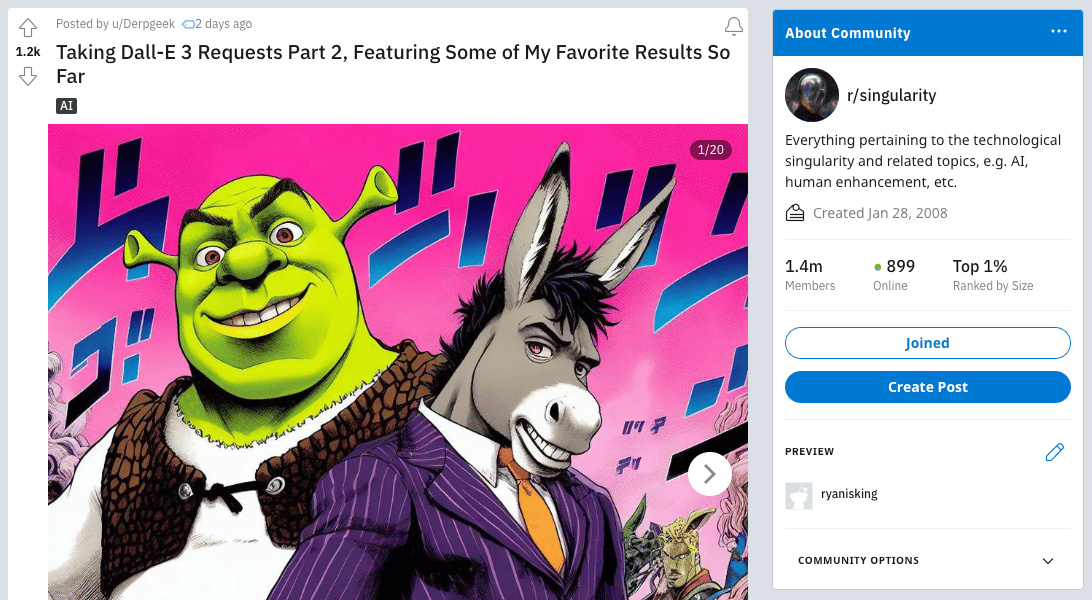
The big innovation with DALL-E 3 is that it doesn’t need prompts anymore. Instead, it uses a ChatGPT integration to generate them for you. Funny enough, last December, in an interview for Fast Company, I asked the founder of a site called PromptBase, a marketplace for generative-AI prompts, if trying to build a business selling them wasn’t a bit short-sighted.
“Some people say that the prompt engineer is the final job before the machines take over,” he told me at the time. “I think that’s when having battle-tested, well-crafted prompts that produce consistent output is genuinely required.”
Well, I suppose the machines have officially taken over. They can see, hear, speak, and, now, they can also communicate with each other. Another role for humans has been removed from the system. Maybe the prompt guys should have tried to unionize idk.
I’ll admit I’ve had trouble following the rhythms of generative AI. I mostly blame cryptocurrency for that. After the incomprehensibly cringefail disaster of the Web3 movement, and Silicon Valley’s complete buy-in of it, it’s been hard not feel like we’ve reached some kind of End Of History moment for technology. We’ve got our screens, we’ve got our services, and they might get faster, but if the people who built them were getting excited about monkey JPGs, perhaps there are just no more new ideas.
And this is why during the lulls between AI releases, I often just assume it’s fizzled out. Which I thought was maybe a me-problem. Like all journalists, I lack object permanence for things that aren’t being talked about at that very second. Plus, I’ve still never figured out how to make one of these tools fit into my own life. But I’m now beginning to realize that this disappearing act between hypecycles is a fundamental part of how AI is emerging. And it’s an insidious one.
AI, by design, is fundamentally not something we experience in collectively public. It exists in chat interfaces, content management systems, and, increasingly, on the camera rolls of our phones. In fact, this week, 9to5google shared some leaked specs for Google’s Pixel 8 phone. It has a bevy of AI tools built into it. There’s an AI for smoothing out video and another clearing up nighttime footage. But the feature that bothers me the most is a tool for Google Photos that uses an AI to aggregate a burst of photos to let you change specific parts of an image. In the demo, a user presses a button to make their unsmiling family look happier in a photo. It’s horrifying in its mundanity. An AI for altering the records of our lives. Something you can quickly do and forget about. Which makes you wonder what happens when we can’t remember if we used the AI on our photos or not? What if a future upgrade tweaks our photos and we don’t even know?
I’ve often compared AI in the past to the switch from a static read-only web 1.0 to social media-fueled web 2.0, but I’m realizing that that’s not really accurate. The first time I saw someone check in at a bar on Foursquare, I knew what I was seeing was new and different, and felt a mortifying wave of secondhand embarrassment accordingly. The rise of AI, however, is much more subtle. It’s not making new experiences, just codifying past ones. And as it gets better, it will become harder to know who’s using it and for what. But it’s still out there, still evolving, still optimizing itself, and if we don’t keep paying attention, it will worm its way into everything and we will no longer be able to know what we’ve made and what it made, including our own memories.

The following is a paid ad. If you’re interested in advertising, email me at [email protected] and let’s talk. Thanks!
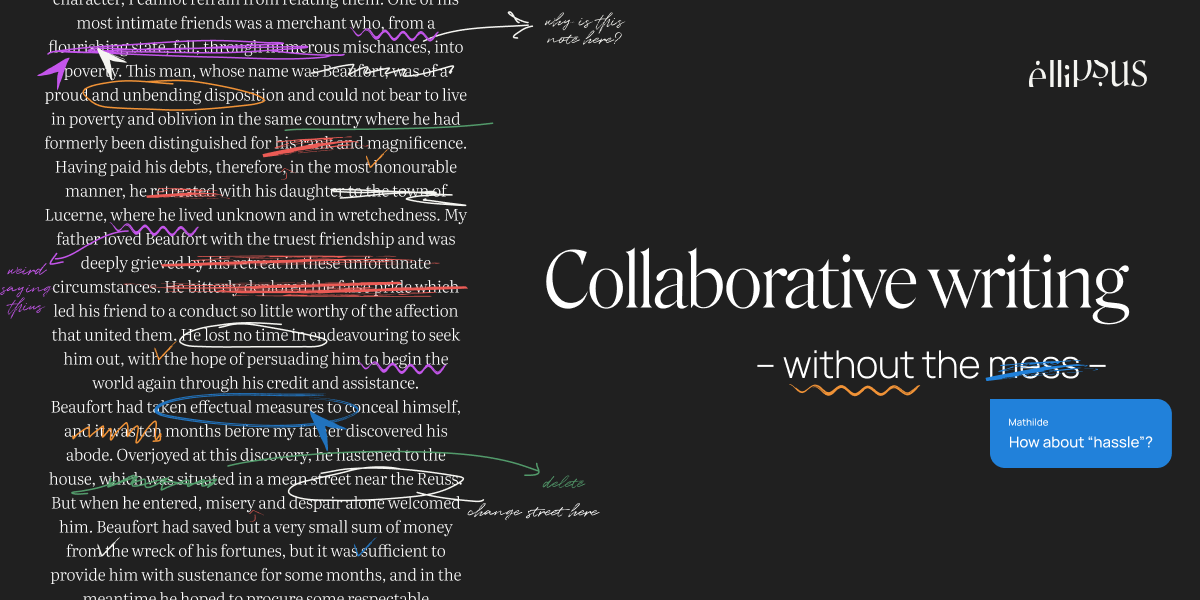
Ellipsus is a new writing tool for people who write together. Think Google Docs meets GitHub: Invite others to edit, share feedback, or submit their own drafts, without losing control over which changes make the final draft.
The app just entered closed beta, and the team is looking for feedback from writers of fanfic, thinkpieces, diatribes—anything long-form. (They value human voices, so AI accelerationists need not apply.)
Who’s building Ellipsus? A team of seven Garbage Day readers lurking across the post-capitalist landscapes of Berlin, Bologna, and Buenos Aires.
As a Garbage Day subscriber, you can skip the waitlist and start writing with Ellipsus today. Click here to join the beta.
A Good Post
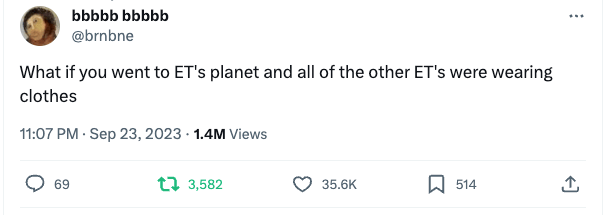
Somehow, An NFT Toy Line Is Headed To Walmart
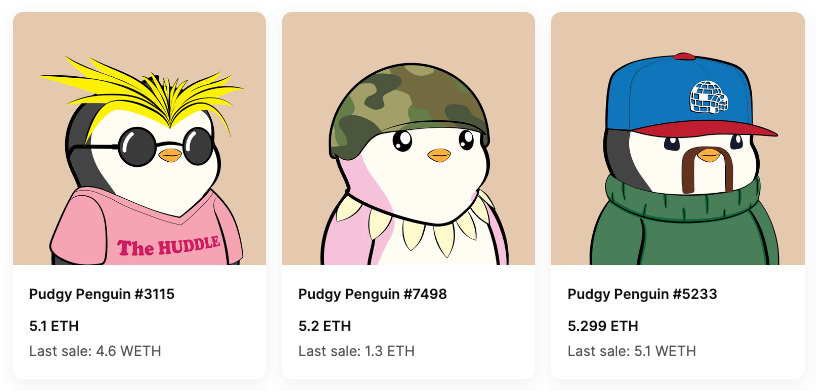
I can’t believe I’m writing this in 2023, but toys based on an NFT are going to be sold at Walmart. Per a report from The Block, a whole slew of toys and plushies based on the Pudgy Penguins NFTs will be rolling out. And, yes, the toys are linked to actual NFTs (for, assumedly, children).
Apparently there’s a QR code on each one that you can scan to get your “Forever Pudgy”. Which lives inside of an Ethereum-based online game world. Also, Pudgy Penguins is paying out licensing royalties to the holders of the NFTs that are being flipped into toys.
My deep condolences for any unsuspecting parents that are asked to buy this and have to figure out how to set up a Metamask wallet.
Bye Bye College Humor
College Humor is finally rebranding to Dropout. Five years ago, Dropout launched as a subscription spin-off to College Humor. And three years ago, IAC, the holding company that owned College Humor, sold it to long-time employee Sam Reich (who appears in the video above).
After the IAC sale, the company has morphed into a fully subscription-based platform that the Dropout team calls “Netflix, except worse. And cheaper!”
The fact that Dropout has now become the flagship brand is a big deal. For any Gen Z readers who somehow wandered into this newsletter, it might be hard to imagine an early digital media landscape where College Humor was a cultural juggernaut of online publishing (their New York media parties were wild lol). But their trajectory since then — into a company supported by actual people paying them money — is fascinating when you compare them to many of their peers of the era, most of which are continuing to jump from layoff to layoff while attempting to stay affixed to Facebook’s traffic runoff hose.
It’s also worth considering this announcement amid the yearly grumbling about the death of the creator economy or the subscription apocalypse that I’ve been hearing is right over the horizon for several years now. It turns out the truth about the creator economy is fairly boring: People will pay for stuff if they like it and if you keep your margins low and scale in a way that those people appreciate, you can keep scaling. Just like, you know, any other business.
…Seemingly Ranch
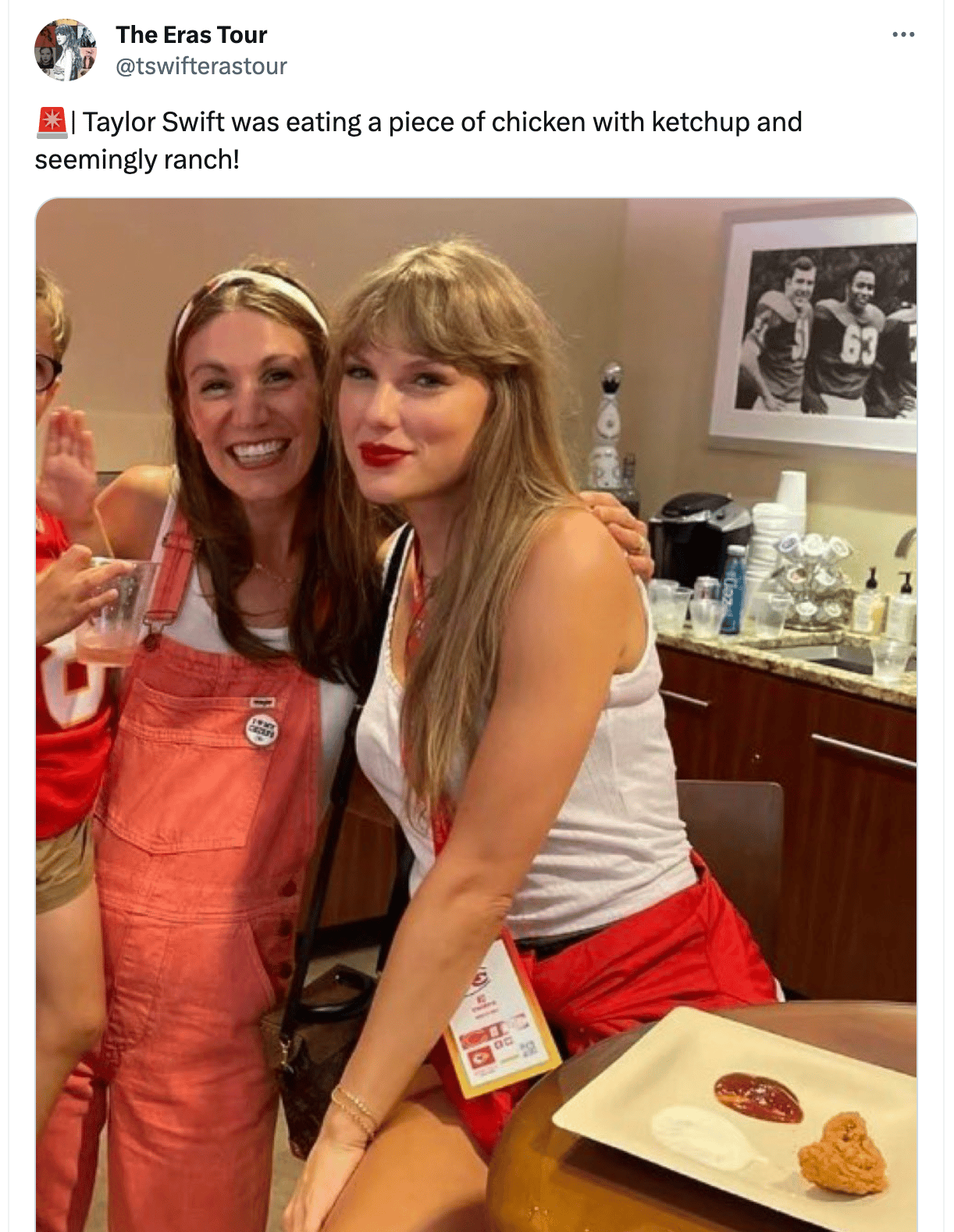
If you’re seeing references to “seemingly ranch,” this tweet is why. The image isn’t high-res enough to see if there is seasoning in there, so I can’t be certain that’s ranch. If you told me Taylor Swift was eating a single piece of fried chicken with ketchup and mayo I’d believe that too.
Anyways, that’s not the wildest Taylor Swift thing I’ve seen this week. That would be this Long Tweet trying to determine Swift and Travis Kelce’s astrological compatibility. Hopefully the Kelce camp posts his birth time so we can get a more accurate reading.
And because we’re at peak Swift saturation right now, obviously, the right-wing grievance machine is trying to figure out how to turn it into a cultural pressure point. It won’t work, but The Federalist is calling her popularity a sign of “societal decline,” and the best take on that I’ve seen so far was from pseudonymous queer erotica author Chuck Tingle who wrote on Bluesky, “Conservative devils have their brains rotting out of their heads. Watch as these goofs wonder why young buckaroos want nothing to do with with their right-wing empty skull takes and constant crying. Honestly kind of blessing that conservatives are so bad at just basic existence.”
Offset Vs. Bobbi Althoff And The Hierarchy Of Search
I think this clip from Bobbi Althoff, the former momblogger-turned-podcaster who now hosts a version of Between Two Ferns for Barstool normies, is very interesting from a tech standpoint.
The clip features Althoff being rude and weird to the rapper Offset, which is her whole schtick. Then Offset says that he tried to google who she was and couldn’t find any info about her and so he had to go to TikTok to figure out who she was. And he treats TikTok’s search as an inferior directory.
There’s two ways to look at this: First, TikTok is still seen as culturally a step down from “real” culture. The other way to look at it, and the one that I subscribe to, actually, is that TikTok is closer to replacing Google than we think. In a weird way it sort of reminds me of how in the early 2010s, getting something printed in a newspaper felt more “real” than having it published online. Which lasted up until we, uh, forgot about that. Because we have a tendency, I think, to overemphasize the “realness” of a media format as it’s dying out. During the early days of streaming music, we did the same with CDs. And, once again, we know how that turned out.
Carpetless Is Real
I love this speedrunning video if only because of how excited everyone in it is. I just learned all of this from watching the video, but from what I understand there is a level in Super Mario 64 that was previously assumed to be unskippable. You had to ride a little carpet up a track around a castle to get the star. Speedrunners, though, have now figured out how to bypass that by using a frame rate glitch that slightly changes the orientation of Mario in such a way that allows you to scale the castle without the carpet.
It’s incredible to think that the seventh-dimensional hyperbeings that run our reality simulation are probably doing the same kind of stuff to us.
Some Stray Links
P.S. here’s the vibe.
***Any typos in this email are on purpose actually***